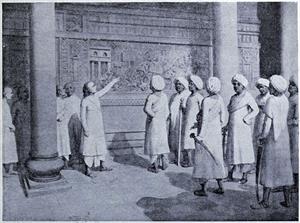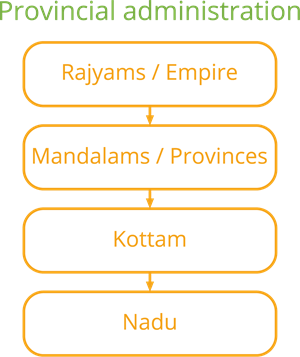
PUMPA - SMART LEARNING
எங்கள் ஆசிரியர்களுடன் 1-ஆன்-1 ஆலோசனை நேரத்தைப் பெறுங்கள். டாப்பர் ஆவதற்கு நாங்கள் பயிற்சி அளிப்போம்
Book Free DemoAdministration in Medieval Period:
The emergence of various Kingdoms in different parts of India also saw unique styles of administration. The administrative realms had further impacts on the Socio-Cultural life of its people.
The administration of different medieval kingdoms in different parts of India had given historians intrinsic details about the advancements of the societies.
The Chola Administration:

Chola king inspecting the temple
The Chola period witnessed a giant leap in the administration as it employed a proper hierarchy which was rarely seen in other contemporary kingdoms.
Cholas had a unique administrative setup named the Village administration, which was not seen among their contemporaries. This shows the cultural advancement of the Cholas.

UR: These are considered the lowest unit of administration among the Village administrative setup of Cholas.
The Brahmanical caste enjoyed greater autonomy under the Chola administration. They were given villages for which they were not liable to pay taxes. Such villages are known as “Brahmadeya Villages”. Their place of residence is named “Aghraharas”.
The Role of Temples and its impact:
Temple construction in South India reached its zenith under the rule of Cholas, who built notable temples like the Brihadeeswara Temple, Gangai Konda Cholapuram temple etc.
These temples served as a source of employment for people. It also owned the lands of the empire and maintained it with autonomy.
The Islamic Society:
1. The advent of Islam as a religion to India was at peace with its contemporaries during its initial stage of development. The growing political clout exerted dominance on the religions, which led to persecution.
2. To escape the persecution of the rulers, the traders, craftspeople, pottery makers and other professionals migrated towards South India.
3. Heterogenisation of culture took place when people moved from one place to another. Southern India also had Islamic Kingdoms like the Bahmani Sultanates, who displayed their dominance by crushing the religious places of other sects.
4. Later, the Deccan Sultanates embraced a secular approach under whom literature flourished.
Poets and writers like Ibn Batuta, Al Beruni and Amir Khuasrau wrote literature and texts about the prevailing society of Islam, which later served as a great source of History.
Reference:
Chola King Inspecting the Temple - Wikimedia Commons